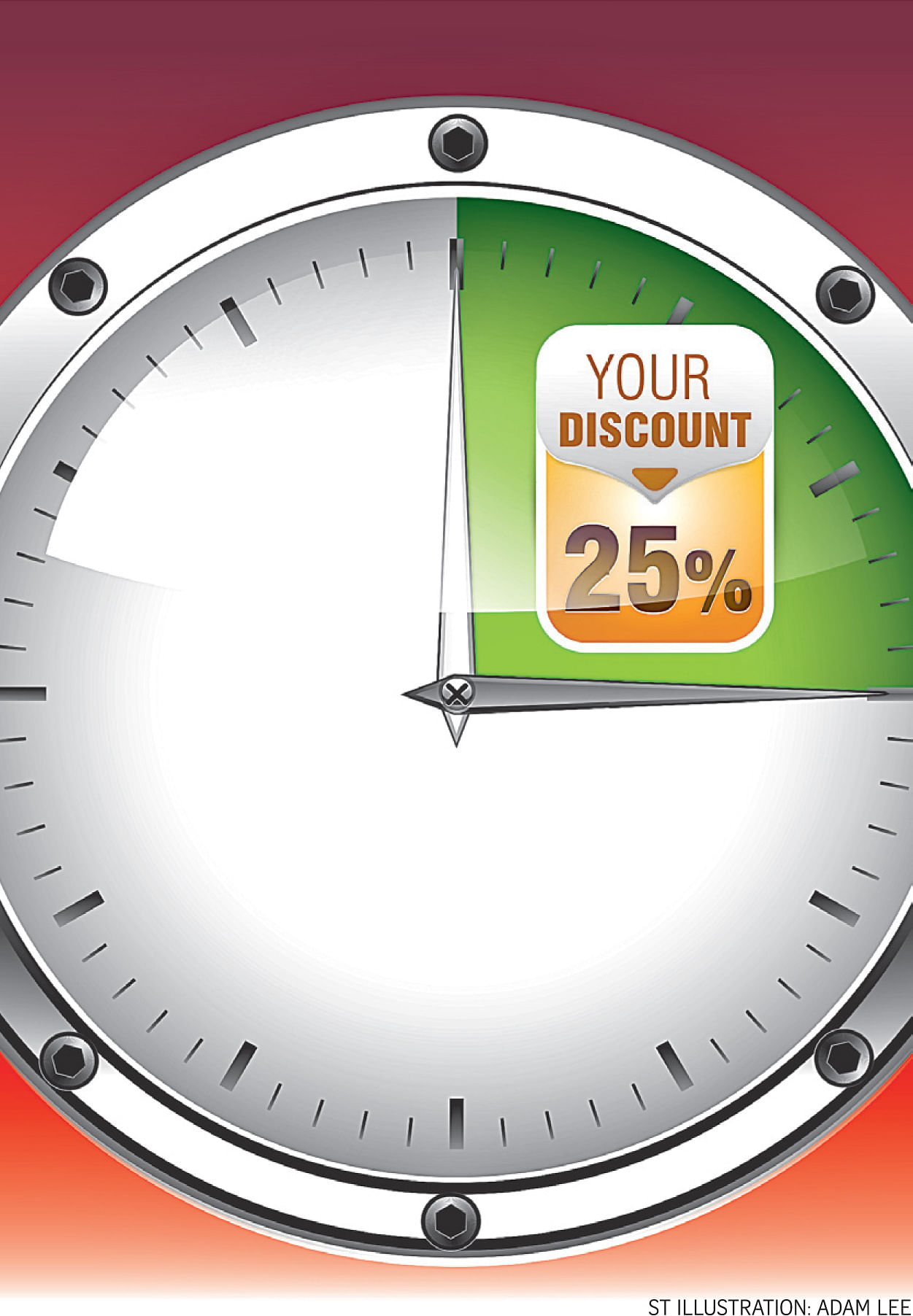Heard of the Eatigo app?
I stumbled only recently upon the food app which ties up with restaurants - not just here but also in Kuala Lumpur, Bangkok, Hong Kong and Manila - to offer discounts throughout the outlets' operational hours.
Instead of a fixed rebate, which is the norm if you use a credit card that has a promotion with an eatery for lunch or dinner, the savings range from 10 to 50 per cent - depending on what time you turn up.
Some places dangle 50 per cent off even if you arrive at peak time at, say, 1.30pm or 8pm. I have used the app several times and toted up the savings, especially if I go with a big group.
My appetite for this business model - giving more power to consumers to select the price options - has now been whetted.
I wish more companies - outside of F&B - would do the same, given that their bottom line is likely to be boosted too by a bigger turnout of value-conscious customers who are willing to accept trade-offs.
But many companies are still behind the curve and dead set in their ways. One example: Noting that gyms are packed only at certain times of the day, I recently asked the manager of an East Coast facility why I must sign up for a costly two-year package.
"Why can't you offer a cheaper package - and create another pool of customers - who prefer to train during off-peak hours?"
But he was unwilling to budge so it is his loss - not mine. Such take-it-or-leave-it practices are sustainable only if the player is the sole one in town but everyone knows the world is changing fast.

With sectors from property and entertainment to transport and retail facing disruptive pressures these days, businesses should embrace differentiated pricing - letting consumers choose when and how they want to use a service - to stay afloat.
If they are already onboard, the adoption of this approach should not be simply a case of tokenism.
Cinema chains, for instance, charge $4 to $5 for weekday movie screenings before 5pm. But why limit this concession to only those aged 55 and above? Is it not better to have a bigger turnout, especially at the start of the week?
But there is no stopping the price differentiation trend, with insurance companies being commendably innovative and aggressive in this arena - in rewarding a change in consumer behaviour for the better.
AIG recently dangled discounts on premiums to those assessed to be safer drivers based on a questionnaire.
The company has joined others in using telematics to gauge behaviour, tapping on computers and wireless telecommunications technologies to transmit data.
In October last year, NTUC Income took to the road to reward careful drivers, based on data - reflecting driving habits - collected using a smartphone-based app.
Before that, in January, MSIG Singapore had rolled out a trial where a device was installed in cars to monitor driving. Safe drivers got up to 20 per cent off premiums.
Other companies, such as budget airlines, were ahead of the game, achieving a longer headstart in giving power to consumers to enjoy greater savings based on their willingness to modify their behaviour.
And of course, Uber and Grab are now shaking up the old taxi meter-based business model.
All this price customisation is possible given the tremendous advances in computing power and data analysis, aided by the fact that many people's behaviour can be tracked via devices or online surfing.
For example, an American dental insurer has a system where it is alerted by a Bluetooth-enabled toothbrush if the user has brushed for a full two minutes.
In return, the diligent brusher is rewarded with free brush heads while the employer which bought his insurance gets premium discounts.On the surface, everybody wins, as policyholders adopt better habits and insurance companies save money on claims.
However, there are concerns that businesses could also use the data to cherry-pick the best and most profitable customers, while hiking rates or even shutting the door on people who do not fit a company's vision of the ideal consumer.
My own take is that if consumers stand to gain by ethical analysis of data, I welcome the roll-out of business models that deviate from the one-price-fits-all one.
On that note, organisations handling essential public services should also jump on the bandwagon.
Can HDB parking fees, instead of being charged uniformly, be cheaper during off-peak periods?
Similarly, can water or electricity rates be fine-tuned by PUB and Singapore Power according to demand patterns over the day?
However differentiated pricing takes shape, it must be coupled with honest and transparent practices. You do not want, for example, to go to a restaurant and get shunted to a badly-located table or be given a time limit to finish eating if you turn up with a 30 per cent discount voucher.

